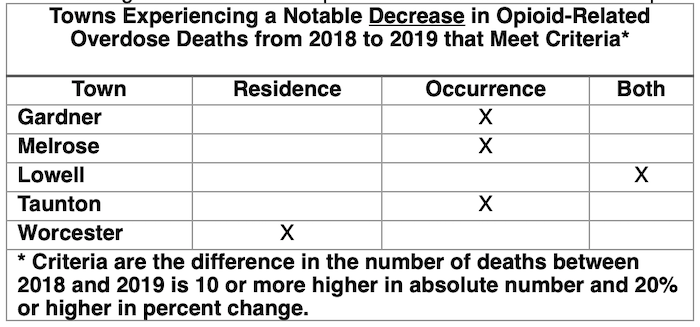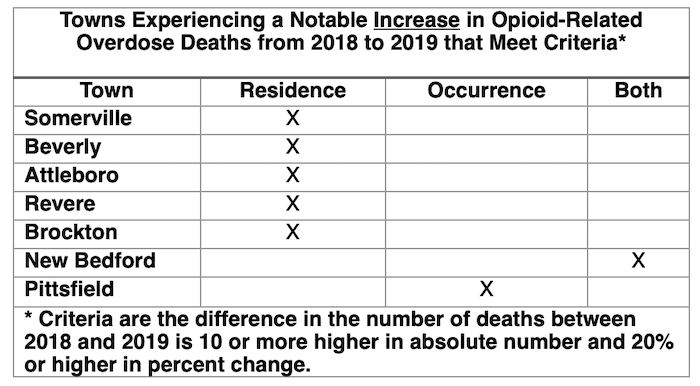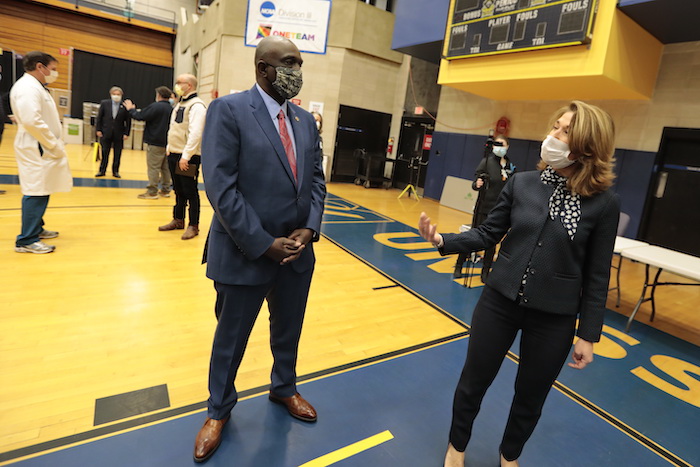Massachusetts opioid-related overdose deaths continue to fall
Opioid-related overdose deaths in Massachusetts continued a steady decline in the first three months of the year, according to the latest opioid-related overdose deaths report released today by the Massachusetts Department of Public Health (DPH).
In the first three months of 2020, preliminary data show there were 467 confirmed and estimated opioid-related overdose deaths, an estimated 28 fewer deaths compared to the first three months of 2019 for a 5.7 percent decline. That trajectory underscores the Commonwealth’s ongoing commitment to stem the opioid overdose epidemic at an unprecedented time in which it is intersecting with the COVID-19 pandemic.
The March figures included in this latest quarterly report are the first this year to overlap with the state of emergency declaration and stay-at-home advisory put in place due to the coronavirus.
“As the COVID-19 pandemic evolves, we have taken action to ensure that crucial substance use disorder treatment and recovery systems remain available in the ongoing fight against opioid addiction,” said Governor Charlie Baker. “While we remain encouraged that opioid-related overdose deaths continue to decline from their peak four years ago, we will continue to carefully consider and monitor any impact the social isolation practices that are helping us fight the virus may have on the battle against opioid addiction.”
“Our administration remains committed to ensuring that the hard-won progress we’ve made in the fight against opioid addiction in Massachusetts continues, even during the unprecedented COVID-19 crisis,” said Lieutenant Governor Karyn Polito. “That has included boosting the availability of lifesaving tools that can prevent an overdose, and using technology to facilitate treatment options while traditional methods are not possible.”
During the pandemic, DPH has worked to ensure that substance use treatment centers have the supplies they need and are able to meet the needs of clients. For example, DPH provided over 13,000 naloxone kits and more than 1,000 survival kits that include naloxone and local resources to help reduce the risk of accidental opioid-related overdose fatality among high risk populations, including people recently released from incarceration. DPH also has worked to expand access to telemedicine in licensed facilities, including providing counseling, group support services, and referrals to treatment.
“From the earliest days of the pandemic, we have worked quickly to implement innovative solutions that keep people struggling with substance use connected to the treatment and recovery services they need,” said Health and Human Services Secretary Marylou Sudders. “Moving forward we must remain vigilant in our efforts to reduce the impact of the opioid epidemic.”
“COVID-19 is demanding a great deal of our focus and attention, but we know the opioid epidemic has not gone away,” said Public Health Commissioner, Monica Bharel, MD MPH. “Creative and aggressive measures by DPH have ensured uninterrupted treatment and support systems in the midst of a pandemic, including access to medication for our priority populations and those at highest risk.”
In 2019, preliminary data show there were 2,015 confirmed and estimated opioid-related overdose deaths, continuing a downward trend from the previous two years, and a four percent drop from the 2016 peak of 2,102 deaths.
Use of the deadly synthetic opioid fentanyl continued to increase through 2019, while the rate of heroin or likely heroin has been on a decline since 2014, according to toxicology reports of opioid-related overdose deaths. Among opioid-related overdose deaths in 2019 where a toxicology screen was also available, 94 percent were positive for fentanyl while heroin was present in approximately 24 percent of these toxicology screens.
Although the presence of fentanyl continues to rise, the 2019 opioid-related overdose death rate of 28.9 per 100,000 people is approximately six percent lower than the 2016 rate of 30.6 per 100,000.
Toxicology screens also indicated that the presence of cocaine, benzodiazepines and amphetamines in opioid-related overdose deaths has remained stable, while the presence of prescription opioids continued to trend downward.
At the municipal level, several communities experienced a notable decrease in opioid-related overdose deaths from 2018 to 2019, including Lowell, Worcester, and Gardner. Meanwhile, Middlesex County marked its third consecutive year with declining opioid-related overdose deaths. Last year, Middlesex County had 95 fewer deaths, a 24 percent decrease, compared to 2016.
Among the findings of the latest opioid report are:
The confirmed opioid-related overdose death rate for females increased in 2019 compared with 2018. Death rates for Black non-Hispanic females increased, while the rate for White non-Hispanic, and Hispanic women decreased.
Males comprise 74 percent of all opioid-related overdose deaths. Between 2018 and 2019 the confirmed opioid-related overdose death rate for Black non-Hispanic and Hispanic men increased, while the rate decreased for White non-Hispanic and Asian/Pacific Islander non-Hispanic men.
In the first quarter of 2020 there were just under 479,000 Schedule II opioid prescriptions reported to the Massachusetts Prescription Monitoring Program (PMP), just over a 43 percent decrease from the first quarter of 2015 when there were 841,990 Schedule II opioid prescriptions.
Just over 213,000 individuals in Massachusetts received prescriptions for Schedule II opioids in the first quarter of 2020, which is nearly a 45 percent decrease from the first quarter of 2015, when 390,532 people were receiving these prescriptions.
In 2019, males aged 25-34 continued to represent the greatest number of suspected opioid-related incidents treated by Emergency Medical Services (EMS), accounting for 24 percent of opioid-related incidents with a known age and sex.
Norfolk County had 40 fewer opioid-related overdose deaths, a notable 23 percent decrease, in 2019 compared with 2018.
Both Bristol and Plymouth counties had an increase in opioid-related overdose deaths in 2019 compared with 2018.
The following cities and towns experienced a notable decrease in opioid-related overdose deaths in 2019 compared with 2018.
The following cities and towns experienced a notable increase in opioid-related overdose deaths in 2019 compared with 2018.



